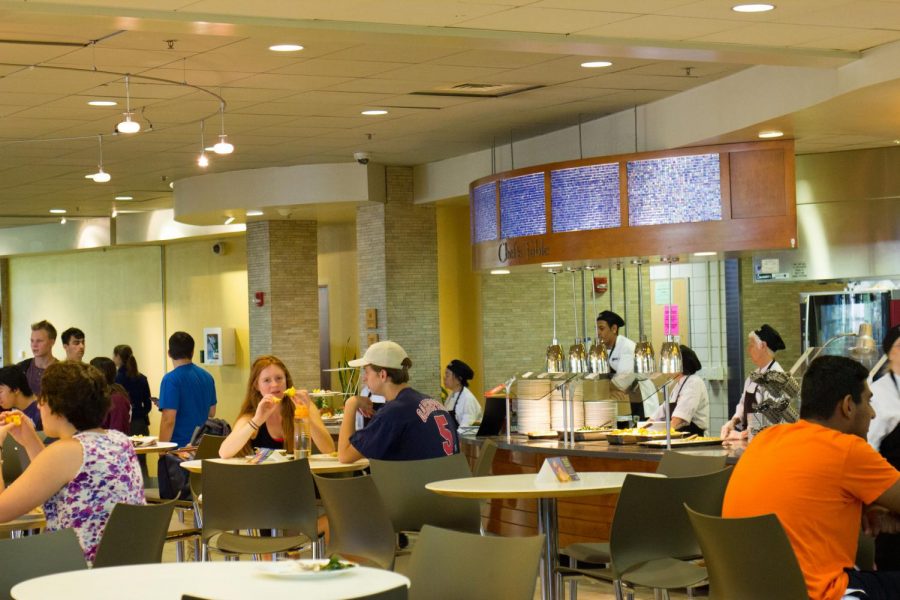The University of Massachusetts is not where a Heisman winner or your top pick for the number one seed in March Madness is produced. We may not be number one — or even number 100 — on the field, but we are number one when it comes to sushi, sushi and more sushi. When it comes to reflecting on what makes UMass, UMass, dining always comes first. UMass Dining has been awarded “Best Campus Food” by the Princeton Review in 2018 for the second year in a row. But with such attention to award-winning dining, it begs the question: Is it really all that great?
UMass Dining is not only famous for its food, but also for how it sources its food locally and serves sustainable poultry. In UMass Dining’s words, “Our program is founded upon four core values: Health, World Flavors, Sustainability, and Community — and our menus are reflective of that. We source locally year-round, serve sustainable seafood, and employ a ‘small plate, big flavor philosophy,’ all in the aim of supporting the New England Food System.”
I find it rather interesting to see signs in the Berkshire Dining Commons that read “Antibiotic-free” and “Grass-fed” when the FDA phased out indiscriminate use of antibiotics in red meat and poultry in 2012. So, Berk might as well label spinach “green” and apples “round.” The advertisement of health and farm-to-table in the dining halls is a veneer of the truth. UMass Dining advertises that it creates bridges for students with allergies and creates a space with limitless options. However, I find this relatively frustrating when upward of 75 percent of the meal choices contain top allergens such as gluten, nuts, corn, dairy and soy. UMass Dining’s Food Allergies brochure states that manufacturers can change ingredients without their knowledge and that UMass Dining is not responsible for any adverse reactions that occur in dining halls. UMass has the resources to create an even better dining experience for people with all allergies and eating restrictions if they were more cognizant of these students. With the help of the nutrition staff, they should be able to offer more meals that are actually plant-based rather than unhealthy meals they advertise as locally-sourced and farm-to-table. Just because it’s farm-to-table does not mean that it’s actually a nutritious or healthy meal.
These boundaries are also an issue for students with cultural beliefs relating to food. For example, some of the black beans in the dining halls contain ham. For many students who do not and cannot eat pork because of their religion, this can be a serious issue. When the pea soup doesn’t list that it contains pork or when the little white identification card fails to mention that the meal contains meat, it can create a massive issue for a paying student.
My personal experience with UMass Dining hasn’t exactly been the most positive one. Over the past year, I have unfortunately come into contact with several bugs in my food. I spend my summers on a full-service farm, so when it comes to bugs, I am not easily squeamish. But on one occasion, I was eating a salad at Berk and shrieked when I realized that a large beetle was crawling in the bowl. On the two separate occasions I came into contact with these two little critters, I contacted UMass Dining and staff who were very responsive and concerned. I recognize running a dining service that serves over 45,000 meals a day leaves room for understandable holes. But when we are paying, on average, $1,000 more than students at UMass Lowell and UMass Dartmouth for an unlimited meal plan, I would really like to not receive extra protein in my salad in the form of stink bugs and spiders.
My point of this article isn’t to wreak havoc on UMass Dining or shed negative light on the hard work the dining hall employees put into creating a wholesome dining experience. I am grateful to not be surviving off of stale ramen and protein bars, but I do believe if UMass was more receptive of student allergies and a tad bit more diligent on keeping little critters outdoors, we could continue to remain number one in the country — and maybe number one in our hearts too.
Morgan Reppert is a Collegian columnist and can be reached at [email protected].





















Ed Cutting, Ed/.D. • Mar 26, 2018 at 2:20 pm
I think the die was cast when they got rid of the trays. Yes, like in your high school, you used to be able to have a tray to carry your food. Not anymore…
The only reason why they can get away with their “sucks to be you” attitude toward student allergies is because it is damn near impossible to sue the state. Go to any other food provider and you will see big signs asking you to tell them about any allergies you may have. And as to not knowing what their providers are putting into the stuff they are selling them — that ‘s BS . There are laws mandating they tell what is in it — isn’t there even a requirement for the posting of calorie counts?
And as to bugs in salads. that makes me wonder if they are bothering to wash the veggies before serving them. Wow….
Do some research — memory is that they have been SHUT DOWN a few times for food code violations in the summertime.
Dan • Apr 13, 2018 at 2:47 am
What the fuck does that have to do with a tray.
John Page • Mar 26, 2018 at 11:59 am
If you’d like to have a serious conversation about these accusations I can gladly connect you with the right people. I believe our Dietian, our culinary team, and our purcashing department and sustainability office would all be able to provide valuable input. Likewise, since Berkshire is directly mentioned, management there would be able to speak to this as well.
Let me know if you’d like me to connect you with anyone of the above mentioned folks.